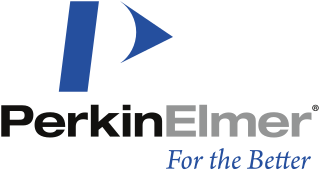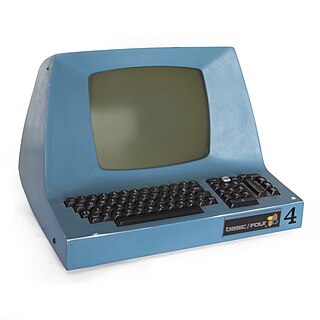Tandy Corporation was an American family-owned leather-goods company based in Fort Worth, Texas, United States. Tandy Leather was founded in 1919 as a leather supply store. By the end of the 1950s, under the tutelage of then-CEO Charles Tandy, the company expanded into the hobby market, making leather moccasins and coin purses, making huge sales among Scouts, leading to a fast growth in sales.
Control Data Corporation (CDC) was a mainframe and supercomputer company that in the 1960s was one of the nine major U.S. computer companies, which group included IBM, the Burroughs Corporation, and the Digital Equipment Corporation (DEC), the NCR Corporation (NCR), General Electric, and Honeywell, RCA and UNIVAC. For most of the 1960s, the strength of CDC was the work of the electrical engineer Seymour Cray who developed a series of fast computers, then considered the fastest computing machines in the world; in the 1970s, Cray left the Control Data Corporation and founded Cray Research (CRI) to design and make supercomputers. In 1988, after much financial loss, the Control Data Corporation began withdrawing from making computers and sold the affiliated companies of CDC; in 1992, Cray established Control Data Systems, Inc. The remaining affiliate companies of CDC currently do business as the software company Dayforce.
Centronics Data Computer Corporation was an American manufacturer of computer printers, now remembered primarily for the parallel interface that bears its name, the Centronics connector.

Acer Inc. is a Taiwanese multinational company that produces computer hardware and electronics, headquartered in Xizhi District, New Taipei City, Taiwan. Its products include desktop PCs, laptop PCs, tablets, servers, storage devices, virtual reality devices, displays, smartphones, televisions and peripherals, as well as gaming PCs and accessories under its Predator brand. As of 2024, Acer is the world's sixth-largest personal computer vendor by unit sales.
Convergent Technologies, Inc., was an American computer company formed by a small group of people who left Intel Corporation and Xerox PARC in 1979. Among the founders were CEO Allen Michels, VP Engineering Bob Garrow, head of marketing Kal Hubler, and operating system architect Ben Wegbreit. Convergent was primarily an OEM vendor with their computers resold by other manufacturers such as ADP, AT&T, Burroughs, Four-Phase Systems, Gould, Mohawk, Monroe Data Systems, NCR, and Prime. The company was purchased by Unisys in 1988.

Kyocera Corporation is a Japanese multinational ceramics and electronics manufacturer headquartered in Kyoto, Japan. It was founded as Kyoto Ceramic Company, Limited in 1959 by Kazuo Inamori and renamed in 1982. It manufactures industrial ceramics, solar power generating systems, telecommunications equipment, office document imaging equipment, electronic components, semiconductor packages, cutting tools, and components for medical and dental implant systems.

Waterloo Maple Inc. is a Canadian software company, headquartered in Waterloo, Ontario. It operates under the trade name Maplesoft. It is best known as the manufacturer of the Maple computer algebra system, and MapleSim physical modeling and simulation software.

Olivetti S.p.A. is an Italian manufacturer of computers, tablets, smartphones, printers and other such business products as calculators and fax machines. Headquartered in Ivrea, in the Metropolitan City of Turin, the company has been part of the Telecom Italia Group since 2003.

Verbatim is a brand for storage media and flash memory products currently owned by CMC Magnetics Corporation (CMC), a Taiwanese company that is known for optical disc manufacturing. Formerly a subsidiary of Mitsubishi Chemical, the global business and assets of Verbatim were sold to CMC Magnetics in 2019 at an estimated price of $32 million USD.
Harris Corporation was an American technology company, defense contractor, and information technology services provider that produced wireless equipment, tactical radios, electronic systems, night vision equipment and both terrestrial and spaceborne antennas for use in the government, defense, emergency service, and commercial sectors. They specialized in surveillance solutions, microwave weaponry, and electronic warfare. In 2019, it merged with L3 Technologies to form L3Harris Technologies.

PerkinElmer, Inc., previously styled Perkin-Elmer, is an American global corporation that was founded in 1937 and originally focused on precision optics. Over the years it went into and out of several different businesses via acquisitions and divestitures; these included defense products, semiconductors, computer systems, and others. By the 21st century, PerkinElmer was focused in the business areas of diagnostics, life science research, food, environmental and industrial testing. Its capabilities include detection, imaging, informatics, and service. It produced analytical instruments, genetic testing and diagnostic tools, medical imaging components, software, instruments, and consumables for multiple end markets. PerkinElmer was part of the S&P 500 Index and operated in 190 countries.
Pertec Computer Corporation (PCC), formerly Peripheral Equipment Corporation (PEC), was a computer company based in Chatsworth, California which originally designed and manufactured peripherals such as floppy drives, tape drives, instrumentation control and other hardware for computers.

Hazeltine Corporation was a defense electronics company which is now part of BAE Systems Inc.
Lear Siegler Incorporated (LSI) is a diverse American corporation established in 1962. Its products range from car seats and brakes to weapons control systems for military fighter planes. The company's more than $2 billion-a-year annual sales comes from three major areas: aerospace-technology, automotive parts, and industrial-commercial. The company, however, is basically anonymous, since its products are either unmarked or bear only the label "LSI". Lear Siegler went private in 1987.

Basic/Four is a variety of Business Basic which originally ran on computers of the same name introduced in 1971. The company that produced the system, Management Assistance, Inc., was later known as Basic/Four Corporation, MAI Basic Four, Inc., and MAI Basic Four Information Systems.

Percom Data Corporation was an early microcomputer company formed in 1976 to sell peripherals into the emerging microcomputer market. They are best known for their floppy disk systems, first for S-100 machines, and the later for other platforms like the TRS-80 and Atari 8-bit computers. The company was purchased by Esprit Systems in 1984.
MAI Systems Corporation, or simply MAI, was a United States-based computer company best known for its Basic/Four product and the customized computer systems that ran it. It was later known for its computer reservation systems.
Amdek Corporation was an American computer peripheral and system manufacturer active from 1977 to the mid-1990s. The company was renowned for their standalone computer monitors compatible with a wide array of systems from the early microcomputer era to the personal computer age. According to PC World in 1994, "Amdek was once the name in PC monitors. Chances are the monochrome monitors most of us used once carried the Amdek label." In the early 1980s, the company was majority owned by the Roland Corporation's Taiwanese subsidiary; in 1986, after a brief period of independence, the company was acquired by Wyse Technology, a maker of computer terminals, who continued the Amdek brand into at least 1995.
Visual Technology, Inc., was an American computer company active from 1978 to 1993 and based in Middlesex County, Massachusetts. It produced a wide variety of smart terminals compatible with a wide variety of terminal protocols—mostly those of Digital Equipment Corporation (DEC)—as well as selling terminals with their own bespoke standards. Toward the end of its existence, it focused on the production of X terminals. In 1993, Visual Technology was acquired by White Pine Software.
ADI Corporation is a defunct Taiwanese manufacturing company active from 1979 to the 2000s. Its primary export was computer hardware—chiefly computer monitors—through its American subsidiary ADI Systems. For a time, it was the fifth largest monitor manufacturer in the world, with major customers including Apple, Compaq, and Optiquest.









